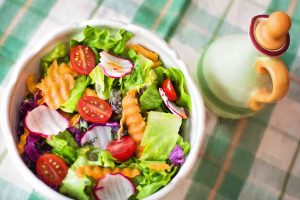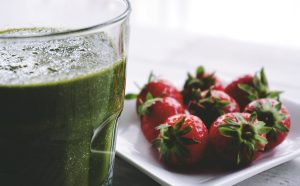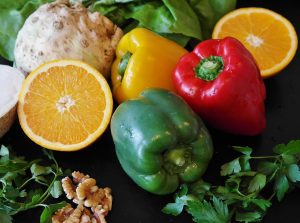What should you eat to meet all these assumptions and provide your body with macronutrients in the right proportions as well as micro- and macronutrients? When looking for an idea for healthy food, it is worth following the recommendations of the National Center for Nutrition Education and the variety of meals. It is worth taking into account in your daily diet.
Healthy products
- Vegetables
They should form the basis of the diet. Add them to any, or at least most, meals. They are the main source of vitamins (m.in. vitamin C, beta-carotene and folate), minerals, fiber and antioxidants.
Eating them regularly reduces the risk of developing many diseases, m.in type 2 diabetes, hypertension or ischemic heart disease. Raw vegetables will be the best choice. Individual vegetables differ in composition and nutritional value. That’s why it’s a good idea to reach for as many different types of vegetables as possible. For this purpose, you can be suggested, for example, by their color. The colour of vegetables and fruits is related to the content of certain substances, so make sure that your plate is really colourful.
- Fruit
They are also a great source of vitamins and minerals. As with vegetables, choose different types of vegetables and eat them mostly raw. Fruit should be included in several meals during the day, but vegetable consumption should still predominate. In total, try to eat a minimum of 400g of vegetables and fruit a day.
- Whole grain cereals
The healthiest will be whole grain products, such as: wholemeal flour and bread, graham, cereals (e.g. oatmeal, buckwheat, rye), coarse groats (e.g. buckwheat, barley pearl barley), brown rice, whole grain pasta, bran. Cereal products provide complex carbohydrates, B vitamins, minerals (e.g. magnesium and iron). They are also a source of dietary fibre that supports the functioning of the digestive system and helps to maintain a healthy body weight. It is worth including at least 3 servings of whole grain cereal products in the daily menu.
- Milk and dairy products
Consume 2 servings of dairy products throughout the day. It can be milk, yogurt, kefir, buttermilk, cottage cheese. Choose low-fat or semi-skimmed products that are free of additives, such as sugar. In this way, you will provide primarily protein, calcium, but also vitamins, mainly from group B.
- Fish, lean meats, legumes and eggs
Products from this group should take up 1/4 of your plate. The healthiest choices will be legumes (chickpeas, lentils, soybeans, beans), as well as eggs and fish. It is best to reach for 2 servings of oily fish per week. There is also a place for lean meat in a healthy diet, but it is recommended to limit its consumption in favor of plant-based alternatives. It will be most beneficial for your health to eat products from this group alternately.
- Nuts, seeds, seeds and vegetable oils
Nuts, seeds and seeds are a source of unsaturated fatty acids and protein. They also contain vitamins (B group, beta-carotene, E and K) and minerals (m.in. selenium and magnesium). Combining or alternating eating different types of nuts, e.g. walnuts, hazelnuts, cashews and almonds, will also work here. Reach for 30 g of unsalted nuts, seeds or seeds every day.
Healthy food will be complemented by vegetable oils, added to dishes in small amounts. Reach for olive oil, flaxseed, walnut oil or pumpkin seed oil and add them to salads or vegetable spreads. Use olive oil or canola oil for frying (but remember not to fry too often).
Not very healthy foods
You already know what to eat on a daily basis. It’s time to take a look at what is better to avoid. Below you will find a list of foods that are worth limiting in your diet. This doesn’t mean you have to forget about them once and for all, but consume them only from time to time.
Healthy food is not products:
- with a high content of added sugar (e.g. sweets, sweetened yoghurts, drinks). They raise blood glucose levels, promote obesity, lead to tooth decay and many diseases.
- containing unsaturated fats, including trans fats (e.g. fatty cold cuts, lard, fatty cheese and cream, salty snacks, fast food, deep-fried products). They raise cholesterol levels, increase the risk of heart and digestive diseases and cancer
- with a high salt content (e.g. cold cuts, salty snacks). Also, try not to add salt to the meals on your plate to reduce the risk of, m.in, high blood pressure, stroke and stomach cancer.
- Alcohol, which leads to impaired absorption of vitamins, increases the risk of heart disease, cancer, skin diseases, hormonal disorders and even reduces fertility.



